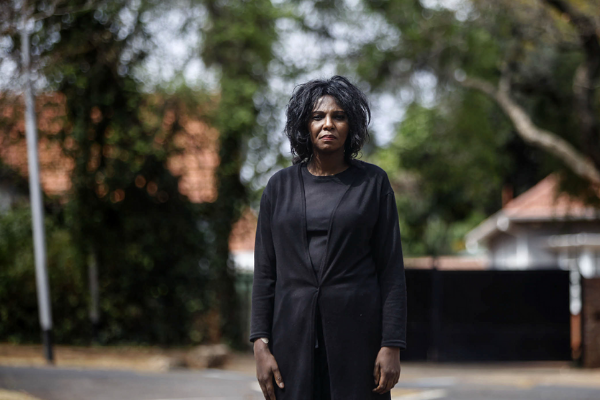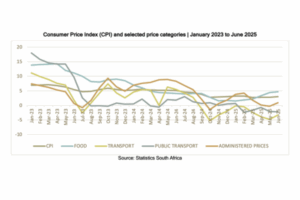At the centre of a landmark court ruling last month was the rights of about a million domestic workers. Union leader, Pinky Mashiane (pictured), says the road ahead is still long. Picture credit – Mail & Guardian
“It’s very sad that in this day and age these events take place and we have a need for vigils,” says Pinky Mashiane, the founder of United Domestic Workers of South Africa (UDWOSA), shortly before domestic workers and their supporters gathered for an overnight vigil on a cold winter night on 16th of June, 2019. The vigil took place in the midst of a peer learning workshop hosted by the Labour Research Service for worker representatives, including Pinky, to map out the ideal example of an inclusive collective bargaining agreement. 16th of June commemorates the 1976 youth uprising in Soweto that sought egalitarianism. Similarly, the domestic workers’ vigil aimed to protest their exclusion in the world of work, and specifically the Compensation for Occupational Injuries and Diseases Act (COIDA). The Act, which was enacted in 1993, compensates employees or their families for work-related death, injuries or illnesses.
“The sector has close to one million workers and at least four of our colleagues die every year from injuries sustained at workplaces,” says Pinky (49), who’s involved in organising domestic workers in South Africa. Pinky can rattle off many names of domestic workers who’ve suffered harm and death due to the
horrible working conditions despite the collective efforts to improve the conditions in the sector over the years.
In February 2019, a domestic worker called Dora was discovered dead in the Pretoria home of her employer who was on vacation at the time. On hearing the news, Dora’s boss immediately ordered her body sent to the mortuary.
“That’s not procedural! The employer should have called the police and informed Dora’s family,” says Pinky.
“Thandi in Mpumalanga also died while the employer was on holiday. Her body landed in the mortuary before the police were notified of the death and the visible bruises. In March, a migrant gardener in Johannesburg succumbed to the injuries sustained when he was attacked by his employer’s dogs.”
Pinky is exasperated by the lack of critical information that can help her to follow up on cases on behalf of the members of UDWOSA. She wants the departments of labour and justice to be more efficient.
“The family of Maria Mahlangu, a domestic worker who drowned and died in 2012 in her employer’s home in Pretoria, is still waiting for the postmortem report. We are fed up and feeling vulnerable and let down,” she says.
In May, the Pretoria high court ruled
the exclusion of domestic workers from COIDA is unconstitutional. The matter was brought before the court in 2016 by Maria’s surviving daughter, Silvia, with the support of Socio-economic Rights Institute of South Africa (SERI). Pinky welcomes the ruling but adds that there’s still a long road ahead. “We look to the court for a favourable decision on retrospectivity – prior deaths and injuries need to be considered,” she says.
Non-compliance with national minimum wage
On 17th of June (the day after the vigil), domestic workers marched to union buildings to present memorandums to the Presidency and the Department of Labour, but the police thwarted the effort. Besides COIDA, their other demands include fixing issues with the implementation of the national minimum wage and a guarantee that workplaces are free of violence, discrimination, harassment and gender-based violence.
“We’d like to know who decided for domestic workers that we’d be left behind when the R3,500 minimum wage kicked in for workers in South Africa. Additionally, some employers have reportedly threatened to slash the salaries of our members who earn more than the minimum wage.”
The implementation of the national minimum wage has not been smooth, and the government and labour are talking tough concerning enforcement of the Act, which makes it possible for an employer to apply for an exemption. There are several reasons why an employer can’t afford to pay the minimum wage. Certainly crooked employers keep the potential wages as a way of boosting profit, and so the majority of workers can only dream of living a decent life. That said, some employers balk paying because they can’t afford it.
“Some bosses have said to our members that the cost of living is now too high and they can’t afford to implement the minimum wage. I think the only fair way forward is to renegotiate for reduced working hours, and not reduced salary.”
Pinky hopes the model agreement that we are mulling, together with 12 worker organisations in both the formal and informal sectors, will improve the monitoring of working conditions by the union and inform unions about the conditions of employment for workers in a changing labour sector.
“Reduce my days of working, and I can use the time to find piecemeal jobs to supplement my wages. But if you reduce my salary, it is unfair labour practice and we will take you on through the domestic workers union.”
Violence, discrimination and harassment in workplaces
“As UDWOSA, we’ve been vocal in various platforms articulating the issues affecting domestic workers and have even managed to garner solidarity across the border (from Botswana Domestic Workers and allied workers Union, through the
Facebook page of LRS,” says Pinky.
“The ILO convention on violence and harassment in the workplace is a victory for all workers, particularly women workers, and also for unions who’ve lobbied tirelessly. We must now ensure our government ratifies the C190 and implements it, together with the accompanying Recommendation. We also need to ensure that our collective bargaining agreements are inclusive and addressing all the old and new issues arising in the workplace.” she says.










